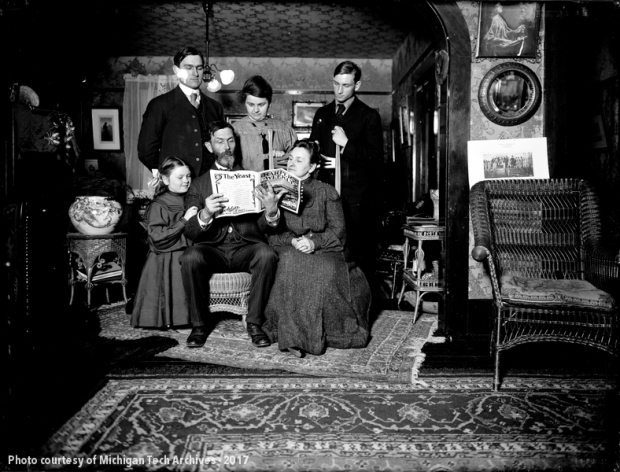While there’s been no shortage of ideas about how to spend the abundance of at-home time, permit the staff of the Michigan Tech Archives to offer one more. Many patrons come to us with genealogy questions, often as they’re just beginning their family history research. While our employees are not able to be in the office and retrieve documents at this moment, we’re still here to help as much as we possibly can! As an archivist and as an amateur genealogist for many years, I’ve found that these tips can make a big difference in getting family history work off the ground. This way, you’ll be ready to hit the ground running when we reopen!
Tips for Beginning Your Family History Research (When You’re Stuck at Home)
- Write down what you know. For most people, this will generally include the names of parents, grandparents, aunts, and uncles. If you can go as far as great-grandparents–or even further–that’s all the better. Next to each person’s name, try to list their dates of birth and death, where applicable. If you know where a person was born or where they lived, add that.
- Notice what you don’t know. Are you missing dates of birth or death for people in your list? If someone asked you where your maternal grandfather came from, would you be able to give an answer? Do you know your paternal grandmother’s maiden name?
- Figure out what you want to know first. Of course, it’s natural to want to fill in as many blanks as possible over time. Starting with such a broad goal, however, will probably overwhelm you pretty quickly. Give yourself something more particular to focus on first. For example, you might say, “I want to know when my great-grandmother Ethel was born.”
- Consider your resources at hand. You might not need to go straight to the internet or call your favorite archivist to get the search started. For example, Bibles often include pages where individuals wrote down the names of their immediate relatives. A family tree in my mother’s childhood Bible–with information provided by her own mother–gave me a starting point for my research when I was nine.
- But remember to be a little skeptical. One of the most difficult lessons in genealogy is that not all sources are accurate. My mother’s Bible misspelled a few names, which made my search a little harder at first. In time, you’ll develop a sense of what documents got the information correct and which ones missed the mark. For now, it’s good enough to remember that, over the course of your research, you will probably need to update the information you compiled in step #1. Be open to changing your assumptions!
- Take a little time to learn about documents. We’re in the midst of collecting data about our nation for the 2020 federal census, and you’ve probably heard about the community purposes for this year’s census. These documents have great value to genealogists, too! The federal census has been taken every ten years since 1790, and the names of all residents in a household were recorded beginning in 1850. Because of privacy restrictions, the most recent census open to the public is from 1940. Now would be a great time to learn about what you can find on a census form and what you won’t expect to find. What census year, for example, is considered to be lost? You can find helpful tips on various genealogical blogs, on the National Archives and Records Administration website, and many other online nooks and crannies. Knowing what you can expect on different types of documents and what’s available will make it easier for you to navigate documents.
- Get ready to search! I’m a big fan of Ancestry because of how easy it is for me to organize what I’ve found. For a beginning genealogist, however, it’s a significant financial investment, and you may be better served by free resources. FamilySearch (www.familysearch.org) is a great example. Although the service requires registration, accounts are free. Materials available on FamilySearch are comparable to those on Ancestry: federal censuses, birth records, and marriage records, among others.
- Keep track of what you search! Before you even start searching, figure out a way to keep track of what places you’ve already checked for documents and what you’ve found; that way, you can reduce your confusion down the road. For some people, this organization is all done online. For others, it might be best to print out materials and file them in a binder or banker box. It’s all about what works for you and your style of thinking!
- Hit the ground running. There’s no time like the present!
If you’re a little further along in your quest, we’ll have a post soon about tips for overcoming brick walls–those trouble spots where you just can’t seem to go further–and making genealogy searches more powerful. Whether you’re a beginner or an old hand, the staff of the Michigan Tech Archives would be happy to assist you in any way that we can while we’re also stuck at home. Please feel free to e-mail copper@mtu.edu or leave a voicemail at (906) 487-2505.
